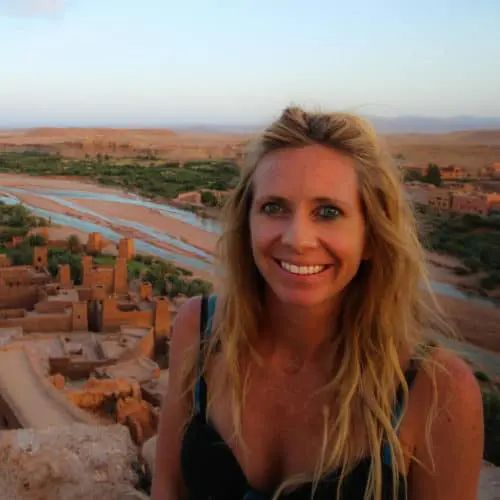Why Visit Now: Essaioura
Eclectic galleries, jazz music festivals and creative spaces have drawn artists to Essaioura for decades, making this city on Morocco’s Atlantic coast a place to rediscover over and over again.
Since its medina was listed as a UNESCO World Heritage Site in 2001, Essaouira has slowly transformed from a little-known seaside port into one of Morocco’s most exciting destinations. Artists and musicians have been drawn to this enchanting coastal city for decades, inspired by its hazy colors, whimsical light and laid-back atmosphere. Surfers and foodies are the latest cohorts to discover the riches of Mogador, as the city was called until the 1960s.
Not only does Essaouira host one of North Africa’s most famous music festivals – in recent years, an increasing number of eclectic galleries, cafes and bars have been popping up in all corners of the city. As travelers seek an antidote to the often chaotic medina of Marrakech, Essaouira’s relaxed coastal vibes and creative spark make it a place worth spending more than a few days in.
1. A Quarter Century of the Gnaoua World Music Festival
Celebrating 25 years this June, the Gnaoua World Music Festival is the biggest event on Essaouria’s annual calendar. Originating in the Sahel region and inscribed on UNESCO’s Intangible Cultural Heritage of Humanity list, Gnawa (or Gnaoua) is a musical style that mixes the secular and the sacred. It incorporates musical performances, dance traditions and ritual poetry from across West Africa, all of which are crafted into a distinctly Moroccan genre.

Over the last two and a half decades, the Gnaoua World Music Festival has showcased the world’s best Gnawa musicians from North Africa and beyond, as well as hosting fusion performances with masters of jazz, pop and rock. While many performances are free (and feel like energetic street parties), some are more intimate and ticketed.
[Photo: Pippa Strickland]

This year’s iteration of the festival guarantees to be all that and more, featuring over 50 concerts blending Gnawa, Brazilian batucada, flamenco, and Zaouli, a masked dance hailing from Côte d’Ivoire. It will also include talks as part of the Human Rights Forum, with this year’s theme centered around the relationship between Morocco, Spain and Portugal as they prepare to co-host the 2030 World Cup.
2. A Creative Cafe Addition at Le Real Mogador
Occupying a 19th-century Italian consulate, Le Real Mogador has been described as a “well of calm and art” amidst the buzz of Essaouira’s ancient medina. It’s here, within the beautifully restored rooms of an old riad, that the works of contemporary Moroccan artists are exhibited, including abstract paintings by the former farmer and bricklayer Said Ouarzaz.
More than just an art gallery, Le Real Mogador is a creative incubator, with actors, writers, and musicians regularly welcomed to perform.
This year, the storied riad is set to add another string to its bow with the opening of a small cafe serving hearty lunches, hot drinks and snacks.
Holding it all together is the genial owner, Francois, who is always on hand to highlight particular works and explain the artistic renovation of this architectural gem. Under his gentle guidance, Le Real Mogador is a place to lose yourself for an hour or two before stepping back into the medina reawakened.
3. Sardines Reimagined at Fish Burger
If you’ve never tried fresh sardines before, Essaouira is the place to do it. You can head down to the lively fish market at the port to have the morning’s catch grilled to perfection or sample sardines in a more modern culinary form at relative newcomer Fish Burger.
This tiny eatery isn’t just pumping out incredible burgers, but also seafood-inspired tapas and a smattering of vegetarian options. It’s the perfect place when you need a change from couscous and tagines but don’t want to forgo Moroccan cuisine altogether.
Everything here is freshly prepared and is served with a smile by the friendly staff. The homemade sardine patties and cheese-stuffed sardine croquettes are always a winner – well seasoned, crunchy on the outside, and delectable within. Adding to the Fish Burger experience is the sun-drenched outdoor seating beside Essaouira’s centuries-old Skala de la Ville (city walls).
4. “Fringe” Festival Vibes at Mega Loft
While Essaouira isn’t known for its nightlife (and few locals drink alcohol), there’s always a humming energy after dark at Mega Loft. Set across four floors, this cafe-cum-club offers enviable views across the medina from its rooftop setting and is one of the few places in the city where you can enjoy a leisurely beer or glass of wine (try the refreshing “vin gris,” a uniquely Moroccan light rosè).
Stay Inspired. Explore the World.
Subscribe to the Wayer Journal and discover a world of inspiring stories and Fernwayer's newest, meticulously crafted private tours.
Throughout the year, Mega Loft hosts local bands and DJs, sometimes concurrently on different floors so guests can pick and choose their mood. To coincide with the Gnaoua World Music Festival, it hosts “fringe” electronica nights featuring some of Morocco’s best DJs, many of whom inject Gnawa rhythms into their sets.
Part of Mega Loft’s allure is its funky decor, with each of the floors uniquely adorned, making for plenty of amazing photo opportunities.
5. Finger on the Artistic Pulse at Espace Othello
Essaouira’s history as an artistic mecca is embodied at Espace Othello, an enchanting gallery that has been showcasing the work of up-and-coming artists since 1993.
It’s one of Essaouira’s most eclectic art destinations, with a revolving display of paintings, sculptures, and mixed media works that illustrate Morocco’s diverse contemporary art scene.
Lovers of creative expression should make a beeline here to discover all the latest artistic happenings in the city.
The name “Espace Othello” pays tribute to the 1949 Orson Welles film shot partly in Essaouira, with the director said to have immediately fallen in love with Morocco. Aside from its diverse range of paintings in the Naïve style, Espace Othello also exhibits modern calligraphies, traditional antiques and works by international artists influenced by Moroccan themes, such as Scottish painter Caroline Fulton. It has long been a place for artists to meet and exchange ideas and currently hosts the Free Artists of Essaouira.
6. Farm-to-Table Fusion at Azouka Eatery
When Azouka Eatery opened its doors in late 2022, the mission of its owners Soufiane and Kaja was to bring Scandinavian flair to Moroccan cuisine, all while keeping things casual and affordable. But the difficulties of connecting with small-scale producers and sourcing organic produce have seen them pivot to farming themselves, taking over a small plot of land to grow salad greens and vegetables now plated in their restaurant.
The menu at Azouka Eatery evolves with the seasons and focuses on tapas-style dishes designed to be shared. Think salt-cured sardines with pink-pickled egg and confit chickpeas with herb-infused labneh, all washed down with homemade fermented drinks like kefir.
Adding to the restaurant’s charm is its breezy setting above Place Al Khaima in the medina’s core.
7. Digital Nomad Design at Mama Lova
Mama Lova is many things. A boutique hotel offering high-end stays in the middle of the medina. A relaxed rooftop bar boasting panoramic views of the Atlantic Ocean. A co-working cafe where digital nomads can while away the hours, without feeling pressured to move on. Since its opening last year, Mama Lova has been catering to modern travelers' needs, creating optimal comfort spaces for those exploring Essaouira for both pleasure and work.
Rooftop panoramic views of Essaouira

-
Rooftop view of the coastal town of Essaouira, showcasing its unique architecture and blue accents. [Photo: Shutterstock]

-
A stunning look at the buildings of Essaouira against the backdrop of the Atlantic Ocean. [Photo: Shutterstock]

-
Panoramic rooftop scene of Essaouira, with its labyrinth of buildings and distant landscape. [Photo: Shutterstock]
Exposed brickwork and wooden beams add to the rustic atmosphere, which attracts creatives and entrepreneurs from near and far. On the calendar are intimate concerts by Moroccan and international artists, as well as themed evenings centered around wellbeing, gastronomy and ecology.
If you’re visiting with a laptop in tow, you can opt for the “Digital Nomad Menu” featuring savory and sweet dishes, plus unlimited (non-alcoholic) drinks to get you through your workload.
8. Restorative Stays with La Vida Surf
Morocco’s Atlantic coast has been luring wave riders since the 1960s and as surf camps began popping up along the beachfront, so did yoga studios designed for post-session stretches.
La Vida Surf (a Moroccan-Finnish collaboration) is one of the newer on the scene, offering surf, yoga and spiritual retreats in the tranquil village of Ounagha, just a short drive east of Essaouira.
Surrounded by centuries-old argan trees and traditional Amazigh villages, its main property, Villa Dar Zitoon, is an idyllic setting for morning mantras, conscious movement and plant-powered sustenance.
Throughout the year, La Vida Surf hosts week-long retreats that include yoga classes and workshops, guided walks and surf sessions, plus explorations of Essaouira – the perfect combination of restorative practice and cultural immersion. Integral to the business model is a deep appreciation for Mother Nature, with 1% of all profits set aside for nature preservation projects.
9. Jazz Beneath the Argan Tree
Behind an unassuming door in the heart of Essaouira’s medina lies Dar Souiri, a beautifully preserved residence that now serves as the headquarters of the Essaouira-Mogador Association.
It’s a vibrant hub for the city’s contemporary cultural scene, with everything from musical concerts to film screenings, art exhibitions and literary events held here.

This December, Dar Souiri hosts Jazz Sous L’Arganier (Jazz Beneath the Argan Tree), a three-day festival dedicated to African and Moroccan jazz. Some of the best players on the continent gather in the courtyard for intimate performances that reflect the diverse interpretations of this global genre.
[Photo: Shutterstock]

Even if your visit doesn’t coincide with the festival, it’s still worth popping into Dar Souiri to check out its changing art exhibitions and the library brimming with books about Essaouira’s cultural heritage. ||

